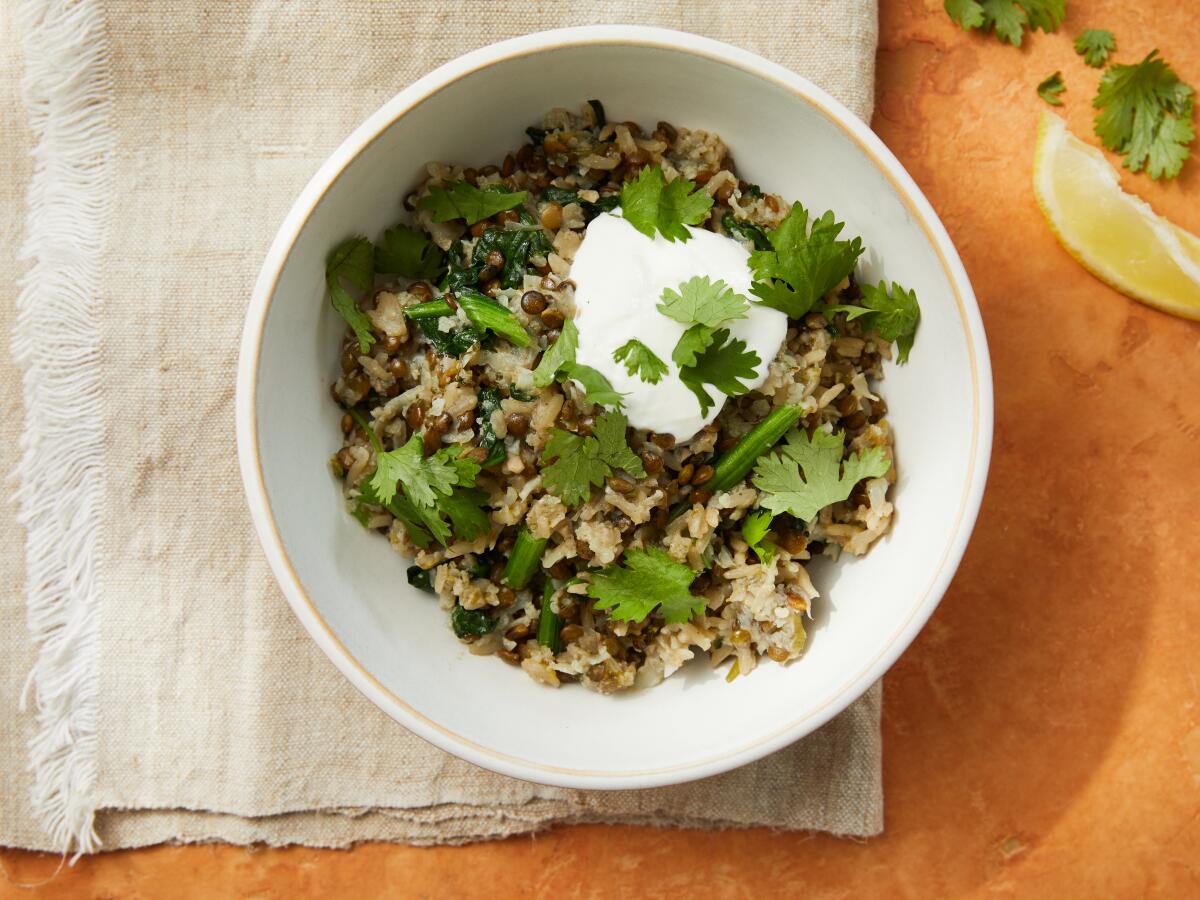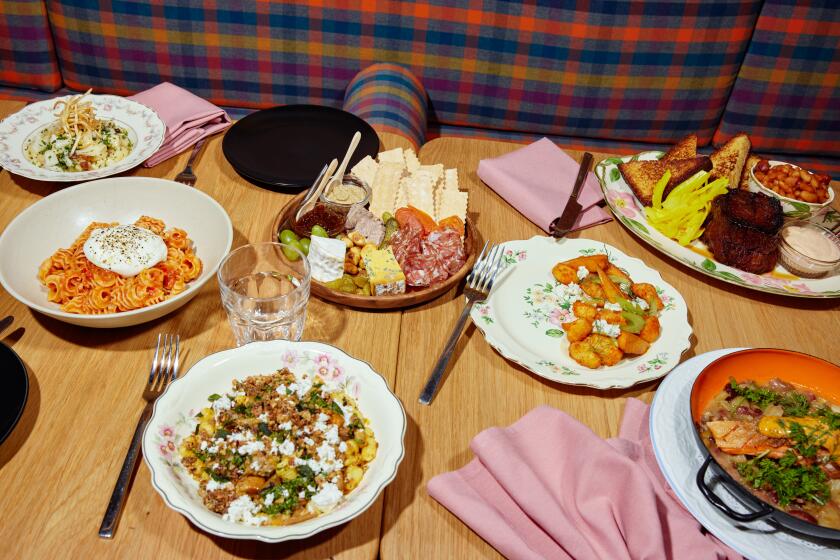Want to start 2025 on a healthy note? Here’s how to build a better grain bowl

- Share via
You are reading our Cooking newsletter
Sign up to get a taste of Los Angeles — and the world — in your own home and in your inbox every Friday
You may occasionally receive promotional content from the Los Angeles Times.
“There’s no rules in the world of grain bowls,” said Fountain Grains & Greens chef Aric Attebery. The possibilities are “endless,” provided you know how to mix and match them well.
At his new East Hollywood walk-up window, the veteran of Bouchon Bistro, Otium and Blue Hill at Stone Barns serves grain bowls, salads and other health-minded options that highlight local farms and the freshest bounty. Six or seven different fruits and vegetables might find their way into a kimchi rice bowl or a citrus beet bowl or a crispy rice salad. And while his culinary background might be centered around fine dining, Attebery wants Angelenos to eat high-quality produce every day of the week — whether at his casual restaurant or cooking at home. For those looking to start off the year on a healthy note, his advice is simple: Build a better grain bowl.
“My North Star when I’m coming up with a bowl is balance,” Attebery said. “You’re trying to think about: How does this come together? All these different parts that individually taste amazing, how do they make something that’s even more delicious?”

He says the key to sneaking in more vegetables and keeping the palate interested — avoiding the pitfalls of monotony — is combining components that balance acidity, sweetness, richness and multiple textures. Attebery also usually incorporates a smoky or charred item, for which he uses a small charcoal grill.
For a tangy or acidic component he’ll often employ a fermented vegetable or salad such as lacto-fermented corn or a cabbage-and-beet-stems sauerkraut (recipe below). Quick pickling for cucumbers, radishes or turnips, he says, also adds great tartness and crunch. Maintaining a larder of pickled and other preserved components can help build quick and flavorful grain bowls and salads year-round.
Vegetables roasted to the point of near caramelization — such as sweet potatoes or sunchokes — lend sweeter, fattier and richer flavor, plus silken texture.
“If you don’t have anything to contrast, you’re gonna get a quarter of the way through or halfway through and you’re gonna have palate fatigue,” he said. “You’re not gonna want to eat the rest of it. That’s why I like to make every individual thing seasoned in and of itself.”
Marinades, too, can make all the difference in differentiating your grain-bowl components. For proteins, Attebery makes “a love sauce” for steaks, chicken and tofu with a secret blend of lemon juice, garlic purée, preserved lemons and more. The bright citrus and acidity helps cut through some of the meats’ richness and the tofu’s creaminess.
Picking the right grains for the base is important too. The most ubiquitous varieties are farro, quinoa and rice, but Attebery recommends asking local farmers which grains are in season, as they tend to rotate the crops throughout the year. Opt for whatever’s in season and locally grown, then try blending the grains for variation in texture and broader nutritional value.

“If they’re growing grains in an organic system, then they’re growing different varieties of grains and legumes in a rotation — one after another — to help keep the soil healthy,” he said. “All of those grains are delicious and interesting and different, so I use a mix. I don’t just pick one.”
Fountain Grains & Greens might offer rye, whole wheatberries, barley or Khorasan wheat. The kitchen sprouts them all in water overnight for easier digestion and sweeter flavor. Once they’re simmered simply in water, Attebery recommends dressing them in something that can stand up to a number of toppings and components: At Fountain Grains & Greens he’s used persimmon kimchi vinaigrette, a white balsamic and Dijon vinaigrette, and a zhoug dressing. When using rice, he likes a saucier topping, such as a braise, due to rice’s better absorption.
“What’s the future of local, delicious, diverse grain growing?” he asked. “That’s what I want to shine a spotlight on: all the farmers that are doing it. A grain bowl like this — and just serving the grains so whole and beautiful as they are — I haven’t seen anybody do a tribute in that way.”
Here are a few recipes from Attebery, along with other recipes and tips from the L.A. Times archive, that can help you build a better bowl in 2025 and beyond.
Eating out this week? Sign up for Tasting Notes to get our restaurant experts’ insights and off-the-cuff takes on where they’re dining right now.
Fountain Grains & Greens’ Sauerkraut and Beet-Stem Salad
This bright sauerkraut made from thinly shaved cone cabbage, pickled beet stems and a range of fresh herbs currently brightens Attebery’s grilled steak grain bowl, but the pink-hued salad makes for a perfect standalone dish or a condiment too.
Get the recipe.
Cook time: 25 minutes, plus fermentation time.

Fountain Grains & Greens’ Grilled Beet Greens
To minimize waste from the pickled beet stems, make another grain-bowl component with Attebery’s recipe for grilled beet greens. This quick, simple recipe calls for charcoal-grilling or sauteing lightly seasoned greens until they garner a char to your liking.
Get the recipe.
Cook time: 15 minutes.

Enjoying this newsletter?
Consider becoming a Times subscriber.
Smoky Tomato Farro Grain Bowls With Tuna and Olives
Tinned tuna, olives and smoked paprika lend an almost Spanish or Portuguese note to this farro bowl, but former L.A. Times Cooking editor Genevieve Ko says that really anything can be eaten with this smoky grain-bowl base.
Get the recipe.
Cook time: 1 hour.

Lentil and Rice Bowls With Grated Cauliflower, Spinach and Yogurt
This grain bowl from recipe developer and food writer Thea Baumann not only combines lentils with rice but also incorporates grated fresh cauliflower for even more texture and a hidden vegetable that ties the dish together.
Get the recipe.
Cook time: 45 minutes.

Mendocino Farms’ Vegan Curried Couscous With Roasted Cauliflower
While technically a pasta, couscous makes a popular grain-bowl base that can be customized in a range of ways; the small, pearl-like morsels easily take on the flavors of dressings and sauces. In this Mendocino Farms recipe sourced by L.A. Times’ former Test Kitchen director Noelle Carter, it carries lime juice, cilantro and vegan mayonnaise, and picks up all the cumin, turmeric, cayenne and other spices that coat the dish’s roasted vegetables.
Get the recipe.
Cook time: 50 minutes.

Have a cooking question?
Eat your way across L.A.
Get our weekly Tasting Notes newsletter for reviews, news and more.
You may occasionally receive promotional content from the Los Angeles Times.




